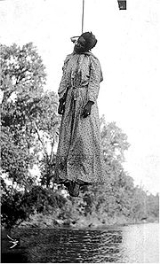siouxsy1
While researching a 1906 lynching in Salisbury, N.C, I learned that the state had enacted a law either meant to be a true anti-lynching law or the pretense of one. Whatever the intent, the law was so poorly constructed it made it almost impossible to convict anyone of the crime of lynching, much less a murder charge for that offense.
In other words, the law made it illegal to break into a jail with the intent of removing a prisoner to do him or her harm, but it didn't really deal with the crime involving the actual harm.
The law was directed at the county sheriff, making him (no doubt a male at that time) responsible for preventing a lynching by providing prisoners, to whom harm would reasonably be expected, special protection. And should the sheriff fail to protect any prisoner, the county would be responsible for damages to "the personal representative of the prisoner thus killed" (N.C. Statutes, Chapter 162-23).
As this played out in the 1906 case in Salisbury, NC, one man out of a mob of thousands was chosen as the scapegoat and convicted of conspiracy, rather than murder or lynching. Given the maximum sentence of fifteen years, George Hall was pardoned after serving four years and four months.
Pitiful as the punishment was, it was apparently the first case in which anyone served time for participating in a lynching mob.
Chattanooga's Sheriff Shipp soon afterward served time (only 90 days) after the Supreme Court judged he'd failed to protect Ed Johnson, whose execution had been stayed by the court.
Concerning the influence of the film "Birth of a Nation," it's also notable that Dixon's play, "The Clansman," on which the film is based, was released in 1905 (Norfolk, Virginia) and had a profound effect on racial violence as it toured the South, particularly the Atlanta race riot in September, 1906. Fearing the play would ignite further violence, some southern towns banned it.
Details of the 1906 Salisbury lynching and a previous one in 1902 are discussed in my book, "A Game Called Salisbury," and an incredible account of the Ed Johnson lynching is found in the book, "Contempt of Court," by Curriden and Phillips.
Susan Barringer Wells
In other words, the law made it illegal to break into a jail with the intent of removing a prisoner to do him or her harm, but it didn't really deal with the crime involving the actual harm.
The law was directed at the county sheriff, making him (no doubt a male at that time) responsible for preventing a lynching by providing prisoners, to whom harm would reasonably be expected, special protection. And should the sheriff fail to protect any prisoner, the county would be responsible for damages to "the personal representative of the prisoner thus killed" (N.C. Statutes, Chapter 162-23).
As this played out in the 1906 case in Salisbury, NC, one man out of a mob of thousands was chosen as the scapegoat and convicted of conspiracy, rather than murder or lynching. Given the maximum sentence of fifteen years, George Hall was pardoned after serving four years and four months.
Pitiful as the punishment was, it was apparently the first case in which anyone served time for participating in a lynching mob.
Chattanooga's Sheriff Shipp soon afterward served time (only 90 days) after the Supreme Court judged he'd failed to protect Ed Johnson, whose execution had been stayed by the court.
Concerning the influence of the film "Birth of a Nation," it's also notable that Dixon's play, "The Clansman," on which the film is based, was released in 1905 (Norfolk, Virginia) and had a profound effect on racial violence as it toured the South, particularly the Atlanta race riot in September, 1906. Fearing the play would ignite further violence, some southern towns banned it.
Details of the 1906 Salisbury lynching and a previous one in 1902 are discussed in my book, "A Game Called Salisbury," and an incredible account of the Ed Johnson lynching is found in the book, "Contempt of Court," by Curriden and Phillips.
Susan Barringer Wells


